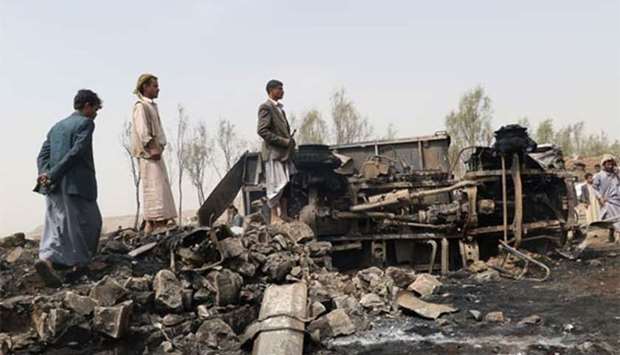Yemeni troops and armour have pushed al Qaeda militants out of main cities in Shabwa, residents said on Friday, regaining government control over the southern province for the first time in years.
They said al Qaeda militants withdrew to the mountains without a fight as armoured vehicles from the government army and a new force known as the Elite Shabwa Forces rolled into the provincial capital Ataq, and other towns and cities from Thursday morning.United Arab Emirates news agency WAM said on Thursday the advance had been backed by the United States and the UAE but it did not specify what support they had provided.
Al Qaeda in the Arabian Peninsula (AQAP) has taken advantage of the civil war pitting the Saudi-backed government of President Abd-Rabbu Mansour Hadi against the Houthi movement to try to widen its control and influence in Yemen.
In a separate incident in the parallel war, three women and six children from the same family were killed in an air strike by the Saudi-led coalition on their home in northern Yemen on Friday, a health official said.
The conflicts have killed more than 10,000 people, displaced millions and created a humanitarian crisis, including a cholera epidemic and widespread famine.
The Shabwa operation marked the first time in years that government-backed forces had controlled all districts in the province, where Yemen's biggest gas project, a $4.5bn Total-led plant, is based.
The terminal stopped operating after foreign experts were evacuated in 2015 but the government says it plans to get the facility working again.
Large-scale ground operations by regional troops have been rare since 2015, when al Qaeda was driven out of the mini-state it had established in the port city of Mukalla, capital of neighbouring Hadramout province. But air strikes by US drones and aircraft against the militant group are frequent.
The US military carried out an air strike in Shabwa in June that killed Abu Khattab al-Awlaqi, one of the emirs of AQAP, along with two other militants.
Operations against the militants are complicated by the civil war, in which the Saudi-led coalition is fighting Iran-backed Houthi fighters and troops loyal to former President Ali Abdullah Saleh in a campaign to restore Hadi's internationally recognised government, now based in the southern port city of Aden. The forces are largely stalemated.
Saudi bombs
In Friday's air strike in north Yemen, the head of the local health department, Dr Abdel-Ilah al-Azzi, said the attack on a home in Mahda district in the southwestern outskirts of Saada, killed three women and six children and wounded three people.
A spokesman for the Saudi-led coalition did not respond to a request for a comment. It was not clear if the house was hit by mistake, but the coalition says it does not target civilians.
A relative, who declined to be identified, said the attack happened before dawn while the family slept.
Pictures from the scene showed the house completely destroyed by the strike. Residents who rushed to the scene were afraid to start rescue work while aircraft hovered overhead.
Saada, a Houthi stronghold , has been repeatedly hit by air strikes since the coalition of Arab states joined the civil war in March 2015. They see the war as an attempt by Iran to expand its influence in Yemen.
At least 25 Yemenis were killed in June when coalition aircraft struck a market in Saada province. In March, a coalition air strike killed 22 people and wounded dozens in a market in western Yemen near the Red Sea fishing town of Khoukha.
In December, the coalition acknowledged it had made "limited use" of British-made cluster bombs, but said it had stopped using them.


